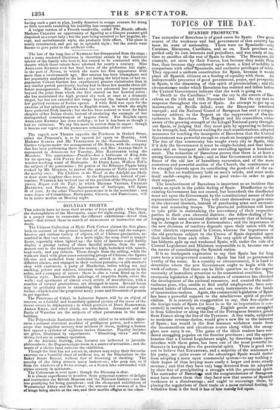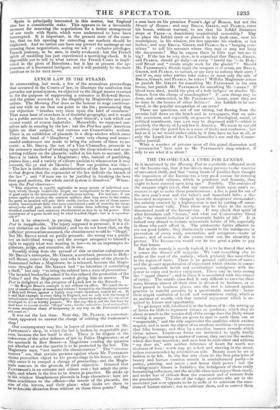TOPICS OF THE DAY.
SPANISH PROSPECTS.
Tin surrender of Barcelona is of good omen for Spain. One great source of the weakness and bad government of that country has been its want of nationality. There were no Spaniards—only Catalans, Biscayans, Castilians, and so on. Each province re- garded only its own interests and prejudices, and was ready at any time to sacrifice all the rest of Spain to them. The Biscayans, for example, set store by their Fueros, less because they made them free, than because tbsy conferred upon them a kind of nobility in comparison with othe?'Spaniards, and exclusive privileges of trade. They opposed a uniform constitution for Spain, because it would place all Spanish citizens on a footing of equality with them. An indispensable precursor of good government, peace, and prosperity in Spain, is the disarming of this spirit of provincialism ; and the circumstanees under which Barcelona has resisted and fallen before the Central Government indicate that the work is going on.
"Death to the Castilians ! " was the cry in the streets of Bar. celona on the 15th and 16th November last. But the cry met no response throughout the rest of Spain. An attempt to get up an insurrection at Seville failed; even the Biscayans remained tranquil ; and the National Guard of Saragossa has sent a congra- tulatory address to the Regent on the suppression of thedis- turbances in Barcelona. The Regent and his councillors, either aware of the growing strength of the Libqral National party through- out Spain, or judging that they must gain by appearing to believe in its strength, had, without waiting for such manifestations, adopted measures for teaching the insurgents of Barcelona that the Central Government was powerful enough to crush an insurgent community. The fate of that community has taught every city in Spain, that if it defy the Government it must be single-handed, and that barri- cades and an insurgent militia are unavailing against a bombard- ment. The reduction of Barcelona proves that there is at least a strong Government in Spain ; and as that Government exists in de- fiance of the old law of hereditary succession, and of the more numerous and powerful section of the Church, the continuance of its strength depends upon its conciliating the good-will of the na- tion. It has no traditionary hold on men's minds, and must make itself useful—employ its power to good ends—in order to gain their support.
The bombardment of Barcelona is important as an incident that marks an epoch in the public feeling of Spain. Disaffection to the existing Government has not ceased, but henceforth the disaffected must act upon the Government by the constitutional means of their representatives in Cortes. They will exert themselve-s to gain votes in the electoral districts, instead of purchasing arms and ammuni- tion and mustering troops. The provincial politicians will learn to take pride in maintaining the ascendancy of their respective parties in their own electoral districts : the fellow-feeling of be- longing to the same electoral district will supersede that of belong- ing to Arragon or Navarre or Estremadura ; and the importance of the new divisions of territory depends upon their union with the other districts represented in Cortes, whereas the importance of the old provinces subject to the Crown of Spain depended upon their isolation from each other. The very spirit of faction, which has hitherto split up and weakened Spain, will, under the rule of a Central Legislature and Ministers responsible to it, become one of the means of consolidating the Spanish nation. It is an inadequate expression to say that Spain has for long
years been a misgoverned country ; Spain has had no government worthy of the name. In a country so circumstanced, it is hard to determine where the new Government ought to begin with the work of reform. But there can be little question as to the ur&ent necessity of immediate attention to its economical condition. The erroneous legislation of Spain in matters of commerce has checked the development of the national resources, and created the multi- tudinous poor, who, unable to find useful employment, have con- tracted habits of idleness, and are ready instruments to the hands of insurrection-makers. Again, the commercial legislation of Spain has been a powerful support to the mischievous spirit of provin- cialism. It is scarcely an exaggeration to say, that five-sixths of the foreign trade of Spain (at least in so far as importation is con- cerned) is carried on by smuggling. English goods are smuggled in from Gibraltar or along the line of the Portuguese frontier, goods from France along the line of the Pyrenees. A tree trade, subjected to moderate revenue-duties, would give a new life to the industry of Spain ; but would in the first instance withdraw trade from the incommodious and circuitous routes along which the smug- glers now carry it on. The gains of the illicit traders have ren- dered smuggling popular on the frontier provinces ; and the appre- hension that a Central Legislature might, by throwing trade open, interfere with these gains, has been one of the most powerful in- fluences in keeping alive the provincial spirit. There is good rea- son to believe that ESFARTERO, and a majority of the statesmen. of his party, are quite aware of the advantages Spain would derive from adopting a more open commercial system—to say nothing o their hopes of thus levying- more easily a larger and more steady revenue ; and that they have only begp deterred from its adoption by their fear of precipitating a struggle with the provincial spirit. The surrender of Barceloos and the congratulations of Saragossa must have shown them that they have now that source of Spanish weakness at a disadvantage ; and ought to encourage them, by placing the regulations of their trade on a more rational footing, to withdraw from it the food it has of late maid/ fed upon. Spain is principally interested in this matter, but England also has a considerable stake. This appears to be a favourable moment for renewing the negotiations for a better arrangement of our trade with Spain, which were understood to have been interrupted. It is important, in the present state of the coun- try, that no fair opening for extending our markets should be neglected. And no nation can have any pretext for umbrage at our pressing these negotiations, seeing we ask r exclusive privileges. French jealousy, to be sure, is easily awakened: but the French spirit of meddling has just experienced a mortifying check. It is impossible yet to tell to what extent the French Court is impli- cated in the plots of Barcelona ; but it has at present the ap- pearance of a frustrated intriguer, and it will probably be the more cautious as to its next move.



























 Previous page
Previous page